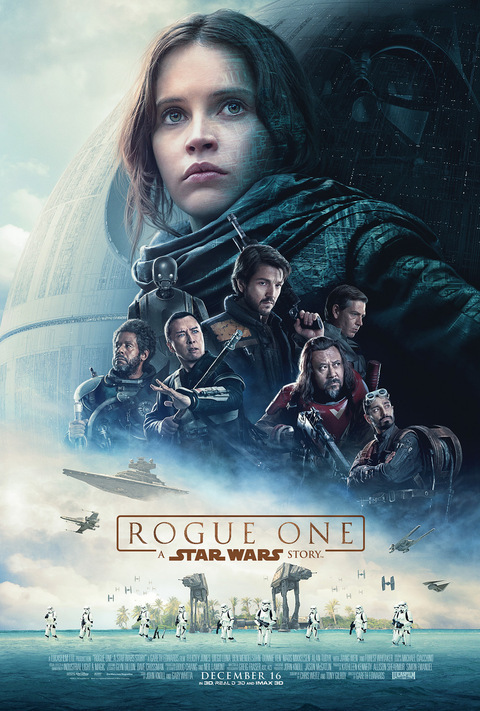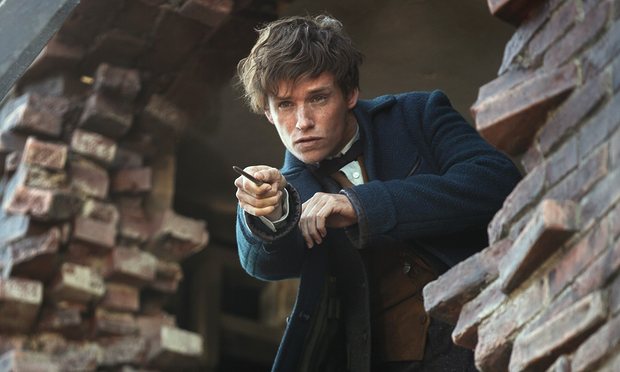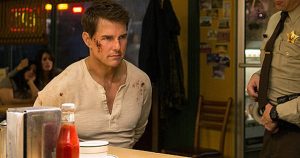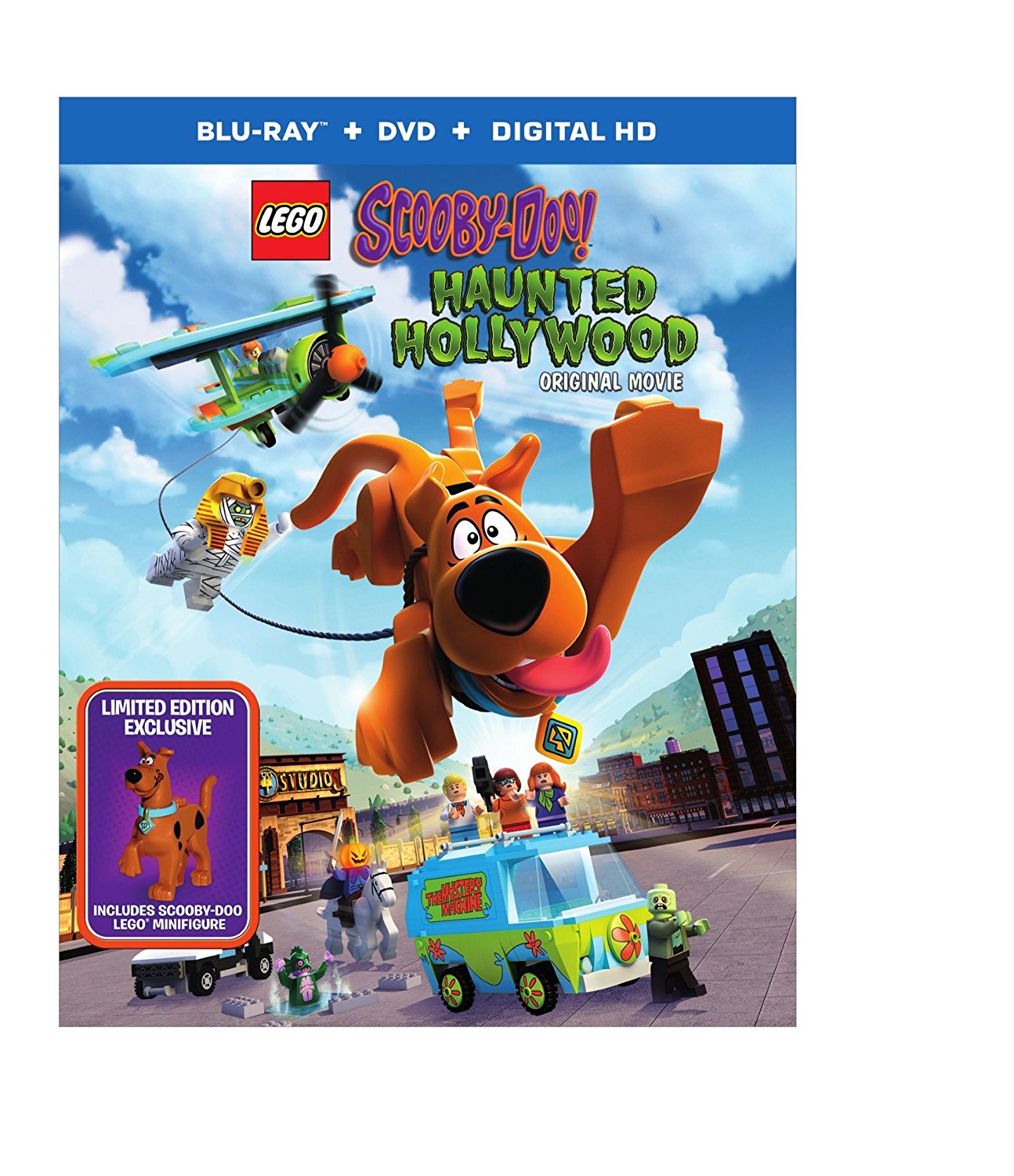Rogue One: A Star Wars Story
Posted on December 13, 2016 at 12:00 pm
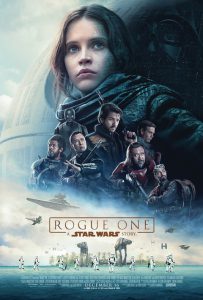
I know, I know, you want me to tell you how it ranks against the other “Star Wars” movies. I’m going to say somewhere between “A New Hope” and “The Force Awakens.” It is a worthy addition to the canon, gorgeously imagined, with striking images, intriguing and richly diverse characters, a suspenseful plot, a worthy adversary, an amusing sidekick, some romantic sparks, and a very satisfying answer to one of the most persistent questions from the very first film in 1977. And without getting heavy-handed or preachy, it touches on some complicated and timely issues.
Once again, we are reminded that this takes place a long time ago, in a galaxy far far away, and thankfully the text ends there and we are immediately in the middle of the action. A little girl with pigtails is breathlessly racing home to tell her parents that the threat they have been preparing for has arrived. “It’s happened. He’s come for us.” “You know what to do.”
The girl is Jyn Erso. Her father Galen (Mads Mikkelsen) was a scientist who once designed weapons for the Empire. He got away and has been living on an isolated farm, but the Empire’s Orson Krennic (Ben Mendelsohn) has found him. He is there to bring Galen back to finish work on the planet-killing weapon we know well from “A New Hope.” Galen explains why he left. “You’re confusing peace with terror.” Krennic responds crisply, and creepily, “You have to start somewhere.”
Jyn’s escape has been well-rehearsed. She knows where to hide. Her mother was supposed to go with her, but could not resist trying to protect her husband. She is killed, Galen is captured, and Jyn is rescued, kind of, by outlaw Saw Gerrera (a dashing Forest Whitaker).
The grown-up Jyn (Felicity Jones of “The Theory of Everything”) has clearly been taking care of herself — and not trusting anyone else — for a long time. But she is captured by the rebel forces, who have received a message smuggled out by a pilot named Bodhi Rook (a terrific Raz Ahmed). The Rebel Alliance wants Jyn to get to her father and find out how to stop the terrifying new weapon, the planet-killing Death Star. Jyn, who did not know whether her father was dead or alive, and hoped he was dead because it would mean that he was not helping the Empire and not abandoning her, must re-think her view of the world (in her case, I guess, the galaxy) and of herself.
Led/accompanied by Rebel Alliance hero Cassian (Diego Luna), his pilot/sidekick droid K-2SO (winningly voiced and motion-captured by Alan Tudyk in one of the film’s most memorable highlights), a blind monk with mad martial arts skills (Donnie Yen) with his firepower-packing friend Baze Malbus (Wen Jiang), and the renegade pilot, Jyn crosses the galaxy to try to rescue her father and stop the Death Star.
So, to recap: good characters, good action, great scope, and just the right amount of fan service. I’m not sure that the digital re-animation of “A New Hope” characters are worth the distraction. And I am not entirely on board with the ending.
No more for risk of spoilers. But there is so much going on, it is worth pointing out some details that might be overlooked in the middle of all the action. Note young Jyn’s stormtrooper doll, an Ozymandias-like massive statue, prone on the sand, the issue of factions within the rebel community, the bigger issue of moral responsibility for actions committed for the larger good, echoes of familiar wartime images from the D-Day landing to hooded prisoners and IEDs in civilian areas.
K-2S0, like Rook and “Force Awakens'” Finn, was formerly with the Empire. It/he has been reprogrammed but a sort of data pentimento has it/him a bit loopy and the result is a dry, even sarcastic wit that adds a bit of a twist to the seriousness of the storyline. This film, more canon-adjacent than linear, has some of that same sense of independence and even improvisation, a welcome waystation before the next chapter of the saga.
Parents should know that this film includes extended sci-fi action-style violence, with many characters injured and killed. There are sad deaths including death of parents, and some disturbing images, including monsters. The script by Chris Weitz and Tony Gilroy is wise enough not to try to answer questions about the complex quandaries of oppression and rebellion, but wise enough not to overlook them.
Family discussion: How did the governance of the Empire and the Rebel Alliance help or hinder their decision-making? How did the hologram message change Jyn’s mind? What does it mean to carry a prison with you?
If you like this, try: “Star Wars” IV, V, VI, and “Force Awakens”

